Text
It is much clearer to me on the second viewing of this film just how anti-consumerist it is. It's actually pretty on the nose in several places, like Chihiro's parents becoming pigs. My 9 year old brain did not catch that.
Spirited Away
This movie definitely had a very strong theme of finding oneself and staying true to yourself. In the beginning we watch Sen and her parents enter the other world, where her parents quickly give way to gluttony losing themselves to the food, inevitably turning into pigs. When they first transform they still have shreds of themselves present via the parents hair and clothing in their pig forms; however, later in the film when Sen goes to the pig pen we become lost as all the pigs look the same. We are led to believe that her parents are among the drove of pigs, but where? If they are there they no longer have their distinguishing features from before, so are they even there? Their selves were lost, and the only one who could potentially save them is their daughter Chihiro (AKA Sen), who managed to hang on to herself completely until she signed a contract with Yubaba. After she signs the contract she forgets her name until she finds a card with her name on it that she brought into the spirit realm with her. As the story progresses she is able to help reveal the truth about Haku's true identity as Kohaku river and help him escape from Yubaba, taker of names and identities.
In conjunction with the preservation of the self, this movie explores the effects of over indulgence and the effects that has on one's self. There are several examples of over indulgence completely changing people within the film, from the transformation of her parents, to the faceless one becoming this spirit eating monster, un-feeling of Sen's emotions. In the beginning it seems that the faceless one is completely enamored with Chihiro, looking to help her at any and every opportunity, but once he gains access to the bath house and indulges in its delights he changes and transforms.
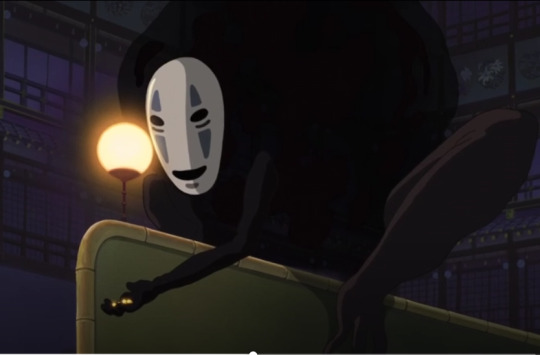
He begins to eat anything and everything, becoming tyrannical in the process, throwing fits for anything that didn't go exactly his way. It takes Sen taking him away from the place of indulgence and exercising the "sickness" out of him. He offers any of the staff as much gold as they desire, but we soon realize that all of it was fake as Yubaba reveals when she is looking for her baby, Boh.
Speaking of Boh I loved his character development. He starts as a spoiled brat that gets anything he wants when he cries for it, but after Zenibaba turns him into a rat? mouse? whatever he was, he finally has to grow and deal with things on his own. It takes him from legimately being incapable of standing, to standing up on his own in defiance of Yubaba when he is standing up for Chihiro. Not only does he gain physical strength, but strength of character, focusing not only on his wants but on others as well by the end of the film. maybe with a little more training and a bit more strength he can finally reach peak "praise the sun" form.
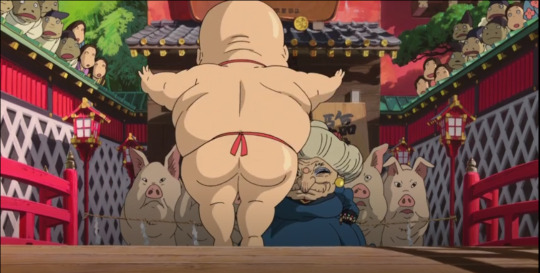

7 notes
·
View notes
Text
千と千尋の神隠し
Spirited Away is easily Hayao Miyazaki's most praised and well known work, especially in North America. My cousin is a few years older than me, and was totally obsessed with Studio Ghibli films back when we were kids. She had all of them on VHS and DVD back in 2006 and we watched them in order of release. We started with Castle in the Sky, which utterly enchanted me. Then we watched Naussicaa of the Valley of the Wind, which is still Miyazaki's magnum opus par excellence in my opinion. After that we got to Princess Mononoke, which is second only to Naussicaa in my eyes. Finally, we got to Spirited Away, and I got so scared by No Face that I had to stop watching. Why No Face scared me more than anything I'd seen in the other Ghibli films we'd watched, I have no idea, the mind of a child is an oft inexplicable place. Some fascinating background about the film itself, it had a budget of about 19 million dollars, which is extremely high for anime production. John Lasseter of Pixar and Disney fame is actually close friends with Hayao Miyazaki and personally led the English localization efforts.
Coming back to the film itself, Spirited Away follows Chihiro and her parents as they're moving to a new neighborhood. The family discovers what seems to be some kind of abandoned amusement park, and Chihiro immediately gets nervous. Her father rushes towards a food stand with her mother close behind, and they start stuffing their faces into ramen bowls. Chihiro walks towards a bathhouse and meets a handsome young lad named Haku, who tells her to take her parents and leave immediately. Alas, her parents have already been pigified and they can no longer return.
The rest of the film follows the fish-out-of-water, Allice in Wonderland-type confusion and wonder of being thrust into another, mysterious world that works very differently from our own. Yubaba is able to take away Chihiro's memory by taking her name, specifically by erasing the second kanji in her name, reducing it just to 千, which means "1,000". Chihiro, now "Sen" has to go up top to work at the restaurant portion of the bathhouse. While working up there, a bizarre, silent spirit named No-Face comes in, and lures in another patron with gold coins and swallows him whole. He continues to demand more food and starts dumping loads of gold on the bathhouse workers.
Upon watching this movie again for the first time in a while, it got me thinking about the "Journey to a mysterious world" trope in media and how differently it's handled in this film. The Spirit World is dangerous, but it isn't Hell. There are good spirits, bad spirits, and what-the-hell-even-is-that spirits. Chihiro and her family are just passersby in this world, and though they aren't really treated well this time, who's to say that if they had landed in another part of the spirit world it couldn't have been better overall?
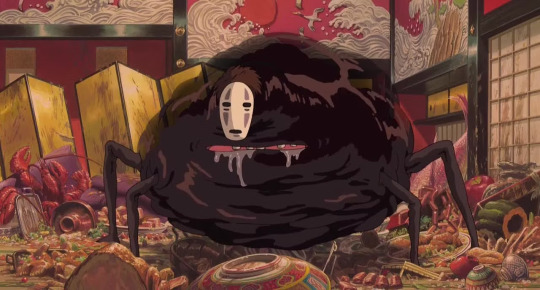
1 note
·
View note
Text
What's so sad is that leprosy isn't even contagious from contact :( according to the WHO: "The disease is transmitted through droplets from the nose and mouth. Prolonged, close contact over months with someone with untreated leprosy is needed to catch the disease. The disease is not spread through casual contact with a person who has leprosy like shaking hands or hugging, sharing meals or sitting next to each other. Moreover, the patient stops transmitting the disease when they begin treatment."
あん - Sweet Bean
I want to start off by appreciating the double meaning of this title in English. Whether it was intentional or not I'm not entirely sure; however, when Tokue entered Sentaro's life she could have easily been described as a Sweet bean. She was very kind to not only Sentaro, but anyone she interacted with, taking every opportunity to admire and love the world around her. With a sense of sincerity with her character, she had been perfecting her sweet bean paste recipe, offering it to Sentaro and breathing life into his long cold heart. Throughout the majority of the film, Sentaro is subject to a mountain of debt. It's explained that the owner of the Dorayaki shop had paid it off, so now Sentaro owed their family, having to work and manage the stand in recompense. Initially he struggles with the Anko recipe and ends up giving up on it entirely in favor of premade Anko. He maintains himself in this sense of mediocrity, slave to the whims of his debtee and his wife. Filled with sadness and content to glumly push through his daily routine, he gives up on the Anko recipe until Tokue presses for employment.
Tokue's employment marks a shift in Sentaro's daily routine, and pushes him to value his work. When Tokue and Sentaro work to create the improved dorayaki, Sentaro for the first time is able to eat the entirety of a dorayaki, but also smiles at his customer's reactions, taking pride in their work. Similarly, the customers too benefit from Tokue's sweetness through daily conversation as she mans the shop and via her upgrade to the recipe.
With Tokue's integration into the shop and Sentaro's life, we are reminded as to why Sentaro is in this metaphorical prison in the first place, when the shop owner's wife returns to complain about Tokue and how she likely has leprosy. The shop owner's wife, (we will name her tsuma from here on) tells Sentaro that he has to fire Tokue, fearful of the stigmata surrounding leprosy, born primarily out of fear and a lack of awareness as to what it is and the treatments against it (while it is bacterial, anyone who has been using antibiotics to fight it (the recommended solution offered by the WHO starting in 1985), is no longer contagious after 3 days). In this act, Tsuma is taking the new found spark in Sentaro's life and asking him to kill all relations with it. She could have tried to help conceal Tokue's identity, or recognized that her shop was multiplicatively more popular due to Tokue's influence and fought on her behalf, but she let her fear and lack of awareness lead her to trying to re-secure the cage Sentaro found himself in.
(realizing im hitting the word count)
She finally puts the nail in the coffin when she decides to entirely remodel the shop and force her nephew into the vacancy left by Tokue's forced ejection. Tokue's influence in Sentaro's life helped him to realize the potential joy of his career and what life could be should he put his heart into it. She acts as a mother guiding him out of the whole he was in and away from an experience she too found herself in at one time in her life, ultimately leading to Sentaro going independent and starting his own Dorayaki venture.
2 notes
·
View notes
Text
餡(あん) An Sweet Bean
I'm now ashamed to admit that I had never heard of Naomi Kawase before this film. I seriously enjoyed this movie, and to my slight embarrassment, I actually cried a little. Films that center around the elderly aren't too common, and I personally feel that they're important given how much of our society is elderly. This movie to me, was about dignity and purpose as one ages, and how elderly people, especially elderly women, often have to push quite hard to be taken seriously. We're introduced to Sentaro, a middle-aged man who runs a small dorayaki shop, that's moderately successful selling to primary schoolers. Sentaro's pancakes are exceptional, but his bean paste (餡) isn't even his own, he buys it from a supplier. The school girls like it enough, so they keep eating it. But one day an elderly woman named Tokue comes by and is thoroughly unimpressed by Sentaro's bean paste. She says that she's a 50-year veteran of bean paste making, and that Sentaro should hire her. Sentaro notices that her hands have some kind of deformity (which I immediately identified as leprosy) and thinks that the pace of the kitchen would be too intense for a woman her age. However, the next day she brings Sentaro some of her own bean paste. Skeptical at first, Sentaro tries it and immediately realizes that her bean paste is really special and decides to hire her. What follows next is probably my favorite sequence of the film, where Tokue teaches Sentaro her perfected bean paste making technique. This whole sequence is just super well shot and really heart warming. Ultimately the shop ends up becoming a success thanks to Tokue, and she feels fulfilled. A great deal of the film revolves around the nature of our relationship to food itself. I think the part where Tokue cheers the beans on as their cooking illustrates that pretty well. Later we find out that Tokue had pneumonia the whole time, and passes away. She leaves Sentaro and his new employee Wakana a cassette of her voice, telling them that people are not valuable just because of what they can do, but because they are people, and should simply be valued for the miracle that life is. This is where I started to ugly cry, since my grandmother told my brother and I this all the time while she was in hospice care with cancer. I learned that Kirin Kiki actually passed away only a few years after this movie, and am deeply saddened that she can no longer grace us with her exceptional acting.

0 notes
Text
I thought South Africa was a strange choice because South Africa is the most industrialized country in Sub-Saharan Africa. A better choice would've been The Democratic Republic of Congo or some other Central African nation.
Besides that I loved this movie, I think it illustrates the atomizing nature of the internet very well, especially in the context of urban Japan, where loneliness is absolutely endemic
Pulse
When watching Pulse, I kept asking myself what the message or idea was behind this movie, and it did a great job at addressing that throughout; however, there are occasional mixed signals. The message behind Pulse that the director had for the audience is that the internet is removing us from genuine human interactions. By doing so its causing everyone to be lonely and effectively become isolated in their own worlds, leading to the eventual death of their connections to humanity.
The movie establishes this idea from the very beginning when Ryosuke connects to the internet. He initially connects only to see others who are connected to the internet feeling alone. Their heads are down, and eventually, even one looks up to see the new soul who joined the system. All are connected, and all are alone. Every time we see ryosuke connect to the internet, he is met with this same sight, of individuals devoid of human connection. During the film, we even see the characters briefly talk about the effects of the internet and how, despite connecting people, the connections it makes are superficial and aren't meaningful like those found in reality.
As internet access is spreading more and more people are being labeled as missing. More are being subject to the isolation brought about by the internet and being ripped from genuine human connection. At the garden, it slowly creeps through, grabbing one person after another under the guise of being a ghost. One by one, people go to interact with a person lost to the "ghost" only for they themselves to discover the remains of their loved ones and become lost themselves. When they search for their loved ones, what they find in their search is the internet. They, too, become exposed, becoming lost to its pull.
In the end, we find that everybody is gone as the reach of the internet has become nearly global, and the only safe spot is reportedly in South Africa. This makes sense because South Africa is generally known to be behind in comparison to the rest of the world in terms of modernization. The internet's reach, while vast, is still impeded by South Africa's lack of access. The thing that is confusing here, though, is how the captain of the ship mentions that there is a signal coming from South Africa indicating its safety. Assuming that this movie is related to the expansion of the internet and the death of human connection, using a signal as a medium for establishing the safety of an area seems like quite an odd choice by the director. The captain could have said he heard a rumor about it being safe, or even that the ghosts haven't been able to make it there yet, but he chooses to indicate it via a signal. It almost makes me wonder if that's the directors way of foreboding the spread to South Africa as well as the coming lack of security for the remaining protagonist.
5 notes
·
View notes
Text
回路!
In Kiyoshi Kurosawa's 2001 horror film "Pulse" (known in Japanese as 回路かいろ "Kairo"), the internet isn't just a place to connect – it's a yawning abyss of loneliness, threatening to swallow any user whole. The story unfolds in Tokyo, the most populous and densely-packed city on the face of the Earth, yet where our characters feel utterly alone. This isolation fuels a supernatural horror unlike any other, where ghosts aren't confined to graveyards, but slither through the very cables promising connection.
Pulse follows several characters, their paths converging as a strange phenomenon grips the city. Many residents begin inexplicably taking their own lives, and those left behind are plagued by disturbing visions – pale, faceless figures appearing on computer screens. This imagery isn't just jump scares; it's a slow, creeping dread. The faces represent a surge of loneliness, a hollowness that spills out of the internet and into the real world.
Michi, a young woman working at a computer help desk, witnesses this firsthand. People call in, their voices laced with terror, describing the spectral encounters. The internet, supposed to bridge distances, has begun its transformation into the existential garbage disposal we know today. Meanwhile, Ryosuke, a hacker, stumbles upon a disturbing website promising a connection so complete, it erases your very existence. This website embodies the film's central fear: the internet as a Faustian bargain: it can connect you to anyone in the world instantaneously but at the cost of your sense of self and reality.
Kurosawa's cinematography is absolutely on point for the whole film. We see characters dwarfed by empty apartments, their faces illuminated by the cold glow of computer screens. The sterile hum of technology underscores the lack of human connection. The ghosts themselves are unsettling – distorted figures with vacant eyes, mirroring the emptiness they represent. The hollowness of their eyes showing clearly the yawning gap between reality and internet simulation they experienced before dying.
The film doesn't shy away from the dark side of human connection in the digital age. We see people using the internet for fleeting moments of intimacy in online chatrooms, only to be left feeling more isolated afterward. The characters yearn for connection, yet their attempts through technology only push them further away. Like a digital Chinese finger trap: the harder you try to force it, the worse you're stuck.
Pulse isn't a film that relies on gore or jump scares. It's a slow burn, a meditation on the anxieties of a hyper-connected world. It forces us to confront the chilling possibility that the very tool designed to bring us together might be driving us apart (honestly "might" isn't even necessary). Even today, the film feels eerily relevant. Social media can be a breeding ground for loneliness, with carefully curated online personas masking the emptiness underneath. A neologism for this phenomenon is "parasocial". Pulse serves as a stark reminder of the importance of face-to-face human connection in a world entirely dominated by screens. It's a film that will stay with me like Ghost in the Shell or Jin-Roh: The Wolf Brigade have.

3 notes
·
View notes
Text
This film horrified me as a child, I watched it with my cousin when I was 7. I didn't even watch it all the way through. Watching it again as an adult, it's almost goofy. Childhood has a way of making things scary that aren't that can never really be captured again.
Ring (1998) by Nakata Hideo - Blog 20
Ring (1998) by Nakata Hideo is a psychological horror film. It is about a journalist, Asakawa Reiko, who investigates into the mysterious death of her niece and her friends. After some clues, it leads her to a tape that is known for being cursed. It causes the viewer to die after seven days from watching it. Asakawa comes into contact with the tape while she went to investigate the site where her niece and her friends hung out. Immediately, she watches the tape and she experiences the same encounters as those who watches it. Afterwards, she partners with her ex-husband Ryuji, who has the ability to sense supernatural beings, to help her resolve the curse before her seven days. Apparently, her son, Yuichi, watched the cursed tape as well because Tomoko told him to do it. This further complicates and rushes them to figure out the case. In the end, they figure out that the curse was caused by a vengeful spirit named Sadako. Sadako was pushed and killed in the well by her own father. In order to uplift the curse, they figure out where she died and retrieve her remains. Unbeknownst to them, the curse was not lifted and Ryuji is killed on his seventh day, meanwhile Asakawa does not. She figures out that you need to let someone else watch the copy of the tape in order to pass along the curse of Sadako. In order to save her son, she is seen driving to her father with intention of having him watch the tape. After watching the film, I felt like the film was intriguing and not very scary as I thought it would be. I could see how the Ring would be more frightening in the past compared to our modern horror films. The scenes that were intended to be frightening or disturbing were humorous. An example would be the pictures of the distorted faces. The shaping and features designed to make it look scary were perceived as silly and like our modern day face filters. Watching this film reminded me of my childhood. I remember as a kid that the older children and my classmates would often talk about old scary stories and curses. It used to frighten me a lot as a kid and traumatized me growing up until I learned that the chances of it happening of them becoming true is low. Just like the story of Sadako, I believe Bloody Mary is similar to it as well. In order to trigger Mary to appear in the mirror, you have to repeat her name a certain number of times in a dim-lit room. Afterwards, she attacks the person who calls for her. Similarly, I believe they are related as being a vengeful spirit and both have a trigger to their curse in their own way.

4 notes
·
View notes
Text
リング!
Hideo Nakata's 1998 film, originally titled "Ringu" in Japan, departs from the conventions of the slasher genre. Rather than relying on graphic violence, "Ring" instead evokes a pervasive sense of dread that taps into contemporary anxieties. The film centers on a cursed videotape that, upon viewing, transmits a fatal curse to the recipient. Reiko, a tenacious investigative reporter, becomes determined to unravel the mystery behind the deaths of her niece and several of her friends, the only connection between them being their prior viewing of the enigmatic videotape.
Reiko's investigation, alongside her former husband Ryuji, leads them down a path fraught with peril. The grainy, unsettling imagery of the cursed videotape foreshadows the sinister secret they are about to uncover: the vengeful spirit of Sadako Yamamura, a woman trapped within a well and inextricably linked to the malevolent tape. Eschewing jump scares in favor of a slow-burning atmosphere of dread, "Ring" preys upon the audience's subconscious. Long, darkened hallways and distorted visuals punctuated by VHS static contribute to the film's unsettling mood. The specter of Sadako herself, characterized by her long, disheveled black hair and pale visage emerging from the television screen, is a truly haunting cinematic image.
"Ring" transcends the horror genre by incorporating thematic elements that resonate with the viewer. Reiko's unwavering determination in the face of her impending demise is a testament to the power of maternal love and the will to survive. The film explores the complex themes of motherhood, self-sacrifice, and the courage to confront one's deepest fears, even in the face of a seemingly inescapable supernatural threat.
The influence of "Ring" extends far beyond the critical and commercial success it achieved within Japan. The film is credited with revitalizing the Japanese horror genre, spawning a wave of J-horror films that found international acclaim. Notably, "Ring" inspired a highly successful Hollywood remake, further solidifying its place within the horror pantheon. However, the enduring appeal of the original film lies in its ability to transcend cultural boundaries. The fear of the unknown, the anxieties associated with modern technology, and the unforgettable image of Sadako continue to resonate with audiences, solidifying "Ring" as a chilling classic of the horror genre that will undoubtedly leave viewers wary of watching any unmarked videocassettes – or perhaps even clicking on mysterious digital downloads. One of the key factors that contributes to the film's enduring legacy is its exploration of the anxieties surrounding new technologies. Released in 1998, "Ring" predates the ubiquity of the internet and social media, yet it taps into a nascent fear of the unknown lurking within the realm of technology. The cursed videotape serves as a metaphor for the potential dangers of unregulated media and the unsettling ease with which sinister content can spread. The film compels us to consider the responsibility that comes with new technologies and the potential consequences of blindly trusting the media we consume.
Furthermore, "Ring" delves into the complexities of human relationships, particularly the bond between parent and child. Reiko's primary motivation throughout the film is to save her son Yoichi from the curse. Her relentless pursuit of a solution and her willingness to confront unimaginable dangers are fueled by a mother's unwavering love. The film explores the depths of parental love and the sacrifices parents are willing to make to protect their children.

0 notes
Text
I wish they expanded a little bit upon Ageha's origins, because she seems to just appear out of nowhere, or maybe I missed it? It's also ambiguous for most of the movie that it's set in the near-future.
Swallowtail Butterfly
Swallowtail butterfly was a wild film. It focused on the zainichi experience in Japan, but with also illegal routes and connections in all sorts of places. We had connections between Glico and a crime syndicate ran by her brother, Ryou Ryanki. The people who own the junkyard being the assassin duo we see earlier in the movie taking out the guy on the moving train. Ageha's interactions with Glico and Ryou Ryanki teasing out the relations and making us the audience hope for their initial reunitement. I will be honest I was kind of lost as to where this movie was taking me and to what the overall message behind the film was, but I talked with some of our classmates after the film.
One major theme built within this movie is the idea of found family. Ageha is originally left to a family member or someone after the death of her mom, and is pushed off onto Glico. Glico almost sells her off only to find that she would be abused and Glico couldn't handle that on her conscious. Originally unwanted and unloved by anyone left in her life, Glico takes her under her wing and slowly but surely Ageha begins to find a family in Glico and Feihong and the people at the their little outpost. She even forms family like connections with Arrow and the others who leave after the counterfeit currency scandal.
The essence of found family is particularly strong between Glico and Ageha. Ageha is originally given her name by Glico, and the idea of the butterfly becomes this symbol of their relationship. Glico has a tattoo of a butterfly on her chest, which is eventually emulated by Ageha in this moment that seems to complete the unification between the two characters. Their bond was strong, but by getting the tattoo she symbolically made their bond permanent and unbreakable.
One thing I thought was interesting was just how aggressively Glico was taken advantage of by the Japanese. They understood that she was a zainichi yentown, but took her image and changed it into something profitable while sabotaging the people who had helped bring her into the limelight. They could have easily cut Feihong into the deal and/or taken advantage of him in a similar way, but they deemed it not worth their time and essentially buried him. The yentown are looked so down upon as people taking advantage of the country and the strength of the Japanese yen, but when it comes down to it, the people taking advantage of the people are the Japanese. Now don't get me wrong, the yentown did get into the counterfeiting, but by taking advantage of Glico, its hard to say that the Japanese are any better.
2 notes
·
View notes
Text
Swallowtail, such a fascinating film!
Imagine a Tokyo of the future, but not the shiny, robot kind. This is Yentown, a sprawling metropolis where immigrants hustle and dream under a sky choked by pollution. That's the world where our story begins with Ageha, a teenager adrift after her mom dies. Bouncing from one stranger to another, she finds a lifeline in Glico, a flamboyant prostitute with a heart of gold.
Glico's world is a rough one. Yentown's underbelly is a mix of ethnicities, all trying to scrape by. There's Ren, a Chinese kid with a knack for fixing things and a mischievous glint in his eye. There's his crew of misfits, each with their own story of struggle and resilience. There's Feihong, a shady but charismatic guy who runs a salvage yard, his past shrouded in mystery. Ageha falls in with this group, a makeshift family navigating the chaos of Yentown's streets.
Feihong hatches a plan to escape the daily grind – counterfeiting yen. It's a risky proposition, but the promise of a better life is tempting. They use their combined skills – Ren's tech smarts, Feihong's connections, and Ageha's sheer moxie – to get the operation rolling. They even open a happening nightclub, "Yen Town," as a front.
For a while, it's almost idyllic. The money flows, and Yentown's underdogs finally have a taste of freedom. Ageha, blossoming into a young woman, even finds love with one of the guys. She explores her own creativity, her artistic spirit blossoming alongside their newfound wealth. But this dream can't last. The Yakuza, the Japanese mafia, catch wind of their scheme. Threats turn violent, and the fragile sense of community cracks.
"Swallowtail Butterfly" isn't your typical crime flick. Sure, there are shootouts and double-crosses, but it's more about the characters and their struggles. Director Shunji Iwai captures their energy with a frenetic, handheld camera style, mirroring the film's raw and pulsating vibe. The soundtrack is a mix of Japanese pop and Western classics, reflecting the cultural melting pot of Yentown.
The film doesn't shy away from the darkness. Poverty, violence, and desperation are all part of the characters' reality. But there's also a glimmer of hope. Even in the face of hardship, they find moments of joy, love, and connection. They fight for their dreams, even if they know they might not win. Ageha, the caterpillar who found herself lost and alone, transforms into a vibrant butterfly, a symbol of hope and resilience taking flight in the face of adversity.
"Swallowtail Butterfly" is a wild ride, a genre-bender that's part crime drama, part social commentary, and part coming-of- age story. It's a film that stays with you long after the credits roll, a reminder of the resilience of the human spirit, even in the face of a harsh and unforgiving world.
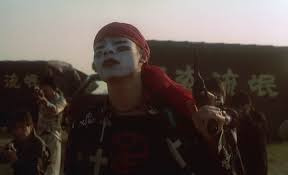
1 note
·
View note
Text
"His actions speak louder than his words, and his love for Miyuki speaks volumes." Took the words right outta my mouth, I wish I put it that way in my post.
花火 - Fireworks
I want to start out by saying wow. Once Nishi decided to rob the bank the plot became pretty obvious and I knew what was coming, but even still. At the end I was silently laughing, not because something funny happened, but because it really did end, just like that.
Hanabi tells a story of two people whose lives were irreparably changed. Detective Nishi and his partner Detective Horibe. In Hanabi, we see Horibe become crippled, forced to retire, and turning to art to try and fill his days. We see how he comes to learn how to interact with his environment and pick up on the little things, incorporating it into his art. We see as he struggles to find meaning in his life anymore and grows bored, despite pursuing this new found skill. His thoughts devolve and eventually he creates a scene of suicide surrounded in snow. 自決 in a torrent of 雪 and fading 光.
Nishi, unlike his old partner, takes a more direct way to the same answer. Nishi, knowing his partner Horibe is gone and his wife is on the brink of death, takes measures to spend as much of the time he has left with his wife as possible. He turns his entire life around, robbing a bank, attempting to get the yakuza off his back, and abandoning his home to share the precious moments his wife has left. They leave home and share special experiences they wouldn't have otherwise, like ringing the bell during the day, and going fishing at a river. Knowing of Miyuki's impending death, they lean away from the constant suffering of fighting against the leukemia and cherish the moments they have and damn the consequences.
From the beginning we know something is bothering Nishi. Despite being in many of the opening scenes, Nishi doesn't actually say anything until 25 minutes in. Throughout the entirety of the film he is a man of extremely few words. Once the plot reveals itself and we know he is going against the rules of the world for his wife, we are able to recognize his silence as quiet resolve. His actions speak louder than his words, and his love for Miyuki speaks volumes. Nishi, despite being potentially left alone with Miyuki's death and Horibe's retirement, could have chosen to continue on. He could have, like Horibe's vision of the world and the actions of his wife and child, thought about himself and started a-new, but he didn't. He chose to love his wife, to show her the best the world and he had to offer, and to exit right along side her.

2 notes
·
View notes
Text
花火!!
Imagine a cop movie where the good guy wrestles with guilt and a world teetering on the edge. That's the vibe of "Hana-bi," a 1997 film by the one and only Takeshi Kitano. Kitano, a real-life comedian with a knack for deadpan humor, also directed, wrote, and starred in the film, lending it a unique blend of darkness and wry observation.
The story centers around Nishi, a detective haunted by a past shootout that left his partner paralyzed. Wracked with guilt and facing his own wife Miyuki's terminal illness, Nishi decides to throw in the towel and quit the force. But with Miyuki's treatment costing a fortune, Nishi makes a desperate move – he borrows a hefty sum from the yakuza, the Japanese mafia. Big mistake.
Now Nishi is on a collision course with disaster. He pulls off a bank robbery to pay back the loan, only to find himself deeper in the yakuza's clutches. The violence unfolds in a slow-burn kind of way, punctuated by moments of unexpected brutality. Kitano's signature stoic gaze adds another layer to the film – you never quite know what's going on behind those impassive eyes.
There's a tenderness to "Hana-bi" that cuts through the gritty crime drama. The relationship between Nishi and Miyuki is beautifully portrayed, their quiet moments together a stark contrast to the chaos swirling around them. These scenes are little pockets of warmth in a film laced with melancholy. We see a genuine love and connection between the couple, their unspoken understanding a testament to the years they've spent together.
The score by Joe Hisaishi is another highlight, weaving melancholic melodies and soaring strings that perfectly capture the film's emotional core. The music is like a character in itself, underscoring the characters' inner turmoil and the sense of impending doom that hangs over the film.
"Hana-bi" isn't your typical action flick. Don't expect shootouts galore. The film is more interested in exploring themes of loss, regret, and the lengths people go to for those they love. It's a meditation on mortality, with fireworks – the film's literal translation – serving as a poignant symbol of fleeting beauty and the impermanence of life. The use of fireworks is particularly striking in a scene where Nishi and Miyuki watch them illuminate the night sky. The fireworks are a temporary spectacle, a burst of brilliance against the vast darkness, mirroring the fragile and fleeting nature of life itself.
The ending is a masterclass in ambiguity. Kitano leaves things open to interpretation, forcing viewers to grapple with the characters' fates and the lingering questions about their choices. It's a film that stays with you long after the credits roll, prompting reflection on the fragility of life and the complexities of human relationships.
So, if you're looking for a crime film with a difference, one that's equal parts brutal and beautiful, "Hana-bi" is definitely worth checking out. Just be prepared for an emotional rollercoaster ride.
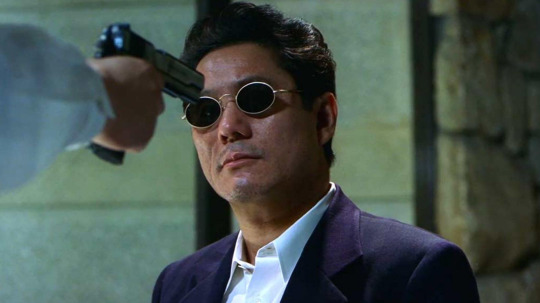
2 notes
·
View notes
Text
I think this film is a triumph of individualism. To almost a Randian degree. All that matters is who YOU are, what YOU make of yourself, what YOU accomplish. All else is utterly superfluous and irrelevant. Could've been written by Brad Bird
Go - Yukisada
Go tells the story of a Japan-born Korean who runs into all sorts of turmoil with regard to his identity. In the beginning, we see the main character's (Sugihara's) father switch between his nationalities, giving very little weight to his national identity. He knows he lives in Japan, but chooses whatever nationality suits him best. Throughout the film, Sugihara's father, Hideyoshi (who played goro in tampopo), is kind of an asshole who plays to whatever works best for him at the moment. His choice form of punishment is beating down his son to the point of causing permanent physical changes to him (for example, Sugihara and the two teeth he lost due to his dad punching him in the face). Even when Hideyoshi recognizes he is wrong (when Sugihara is yelling at him after Hideyoshi's brother died), he still chooses to beat down on Sugihara and a full-on ring fight commences, announcer and everything.
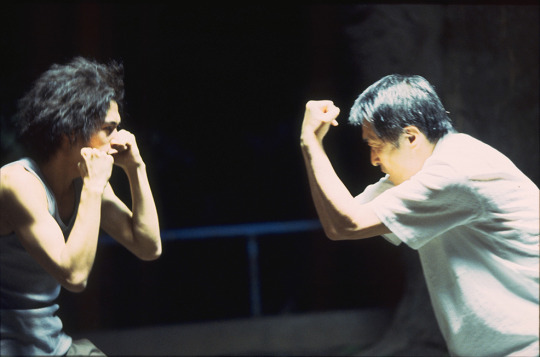
His old ways of disciplining Sugihara and his old ways of thinking about race and identity are a key factor that separate he and his son. Sugihara and his ideals are those of the new generation, and he continuously has to battle with those of the old, whether it be when boxing against his father, or when he argued with Sakurai over idea's implanted into her by her fathers old way of thinking.
Repeatedly, we are told by Sugihara that this movie is about his love story, but more realistically, it's about his fight against the restrictions of identity, and the fixed expectations that come with said identities. He fights to try and be seen as an individual rather than a classification, and only succeeds after being raked through the coals by both Sakurai and Hideyoshi. It takes the fight with Hideyoshi for him to clear his head and hear Sugihara's plight, while Sakurai has to seclude herself from Sugihara to have time to contemplate what she has been fed all of her life.
Personally, I feel like this movie not only appealed to audiences of the time, but still has a great deal of relevance today. Nowadays, it feels as if people are once again clinging to these ideas of identity and self-imposed segregation, and with this, people are becoming hostile towards those outside of their in-groups. It's extremely prevalent within politics, between democrats and republicans, where if you identify with one group, a hefty sect (albeit not all) of the other group will deem you as "the enemy" and as someone to convert. The movie helps to bring this idea that I am not simply the product of my parts. I am not simply a Korean and thus of tainted blood. I am an individual, just like everyone else, and should be seen as one.
6 notes
·
View notes
Text
GO!!
Wow, what a phenomenal film. Wada-sensei actually recommended this film to us in Advanced 2, and I was considering watching it. The question sensei asked us in class was about using our "real names" in the US and if we felt comfortable doing so. The US, being a nation built by countless different peoples, isn't in the same position as Japan. It's quite common for people here to have "mixed" names of Anglo-Irish, German-Dutch, Spanish-Basque, on and on. What it means to be American is an ever-evolving discussion.
Lee's father is my favorite character from this film. His frustration and grief are extremely relatable, and the sacrifices he makes for his family are admirable. Obviously he goes too far with just how hard he hits Lee, but you can understand why he does, it's not totally arbitrary. His complex relationship with his North Korean identity was very fascinating to watch, since you typically see ex-pats from pariah states portrayed simply as despising their home nation and willing to do anything to stay away from it. But he describes himself as a committed Marxist even after living in Japan for (presumably) decades and watching North Korea devolve even further into tyranny and poverty. I think he finally starts to come to terms with the true nature of his home country when his brother dies and Lee insults his retelling of fond memories of him. He understands that the only path is forward with his family in Japan (or maybe America).
I am not at all an expert on Japanese self-defense law, but there is a chance that Jong-il's killing might've been justified from the perspective of the Japanese student. Jong-il begins to beat the student over the head with his bag, and shows no sign of stopping. The Japanese student also did nothing to deserve this, all he did was awkwardly approach the Korean girl and get quietly rejected. He then begins to step away, and Jong-il approaches him. Jong-il assumed that the Japanese boy was going to attack her, but based on what? He didn't see a knife, nor did the boy immediately show signs of physical violence. Where the Japanese school boy's case falls apart is what in American law would be called escalation; he responded to a not-immediately-lethal threat with a lethal one, which I'm assuming he didn't legally possess. In some US states you could get away with this, but not in many. There was a case in NYC recently where a man defended his girlfriend from a homeless man touching her by stabbing the homeless man, but these cases are rare. In my opinion, both Jong-il and the Japanese boy were victims of blind-hatred and ignorance: the other Japanese boys edged him on to ask out the Korean girl because they assumed she'd be "easy meat" and he ended up taking an innocent boy's life for it. Jong-il was blinded by passion and frustration with Japanese society and assumed the worst of this Japanese boy with little to base it on.
0 notes
Text
The egg scene will live rent-free in my mind for the rest of my life.
I really loved this movie. It's smiles from start to finish, it's so well written and composed. Much needed optimism in these bleak times
Tampopo
Tampopo discovers the true depths and importance of food within the soul of every man woman and child. The film focuses on Tampopo, a ramen shop owner looking to revitalize her shop and really learn what it means to cook ramen. The movie goes through the motions showing the blood sweat and tears, and most important the dedication to study that one needs to truly master a recipe. It shows people's connections to food and how people from all walks of life come together to enjoy meals from the same place. One way the film did this was by bringing together the crew in this shot.

in this one shot you have people who are dressed as individuals from all different walks of life. Starting from the left you have Goro, who looks like he just came from the Australian outback and is on leave to Japan; Gun, who looks like he could be a painter or someone focused in the arts; Sensei who looks like a film director stopping in at his local ramen shop; Shohei, who appears to be a normal salaryman or office worker coming in a suit and tie; and finally, Pisuken who attire makes him look like a detective. In reality, they all have jobs that work to create Tampopo the ramen shop what it is, but their portrayal in this scene really helps to solidify the idea that food lovers come from all walks of life. It goes further in developing this idea with its interludes from Tampopo's life. There are several different people enjoying food in different ways around different circumstances, with criminal's and crooks, to lovers, to business men in fine establishments. It talks about the customs surrounding eating and how they differ between peoples. For example, when the foreigner's way of eating pasta is being studied, only to be revealed to be completely opposite to the way they were being taught.
Additionally the film explores the different relationships people have with food. Some just like to enjoy their meals around a bar while others... well... we all saw the scene where they were trading the egg yolk between their mouths.
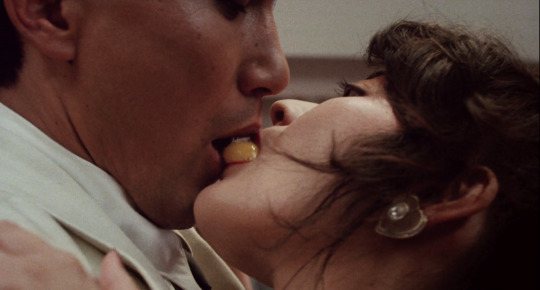
Their sexuality surrounded food and it's thought to bring this kind of orgasmic reaction between the two of them. This goes to show the power food can have and the emotions and feelings it works to manipulate.
3 notes
·
View notes
Text
Tanpopo!!
This is either my third or second favorite film we've seen so far, mostly because I've seen it before. This film is just a delightful acid trip from start to finish. It keeps you on your toes the whole time and will leave you scratching your head, but with a stupid smile on your face. It's only 115 minutes but feels like 3 hours, in a good way. I was shocked to learn Roger Ebert actually gave it a 4/4, pretty rare from him.
The film proclaims itself as the first "ramen western", which is a funny little play on "spaghetti western". Tanpopo certainly feels like a western during many segments of its runtime, and like a "oh I had this cool idea let's do that" kind of film during other parts. During either part though it's shot very well, has great music, acting, and especially set design. One of my favorite moments being the homeless cookout scene, really feels like the film crew just rocked up to a bunch of homeless guys and started filming them cook.
Tanpopo simply exudes soul from every fiber of its being. The titular character is extremely relatable and believable. She struggles a lot with her shop, learning how to make it better, learning how to cook better, helping her son, and so on. Everyone can find some aspect of Tanpopo that they've experienced in their own lives and relate to her. Kind of strange that the other truck driver just kind of vanishes for most of the film though.
The film almost feels like it's in constant but dynamic motion. Sometimes it's slower, sometimes it's faster, but it's always moving towards the goal of Tanpopo building her restaurant. Well except for the very end when the camera watches a woman breastfeed her infant for ... several minutes?? That was really strange, felt like an invasion of this woman's privacy.
The scene where the man in the white suit is gunned down in the street is still very strange to me, partly because we know very little about him and his lover but also because we can't see where the shooter was. I think it's supposed to be a kind of Twilight Zone-esque tragic-ironic ending for him since he "wanted his life to be like a movie" and he dies in a very cinematic way, but it's a bit odd.
I definitely want to watch more of Itami's movies, especially after learning that he was murdered by the Yakuza for trying to expose their involvement with a cult. Absoluete mad lad.

0 notes
Text
Family Game 1983 Morita Yoshimitsu Neil McInnis JPT3391
Throughout the entire watchtime of this film all I could think of was Whiplash, the 2011 film where J. K. Simmons mentally and physically torments a young jazz drummer. However, this film isn't so much about the relationship between master and student as Whiplash is. It's much more about the strained family dynamics of early 1980s Japan, the demands on every family member from society writ large, and the lengths that families were willing to go to get their children into prestigious universities. One facet of this film I found particularly interesting was the relationship between Shinichi and Shigeyuki.
Shinichi, the older brother, has already gotten into the prep school that his father wanted him to get into, Seibu High. Shinichi experiences a kind of post-accomplishment aimlessness; he's lost motivation to study since his motivation was to get into Seibu in the first place. He has reservations about going on to university since it doesn't seem to fit his life anymore. Shinichi is now much more interested in talking to girls and hanging out with friends for the vast majority of the movie. He's almost switched places with Shigeyuki.
Shigeyuki is struggling a lot with school, but not because he's simply not smart enough, he just has little to no drive to do so. He's much more invested in drawing and reading about rollercoasters than Japanese language class or English. It's not until his father has had enough of his slacking and gets an at-home tutor that Shigeyuki sees any improvement in his grades. This tutor quickly proves to be far more than Shigeyuki's father bargained for and ends up being physically abusive almost immediately.
The tutor, Mr. Yoshimoto, is a tall, imposing man who immediately establishes his dominance over the Numatas. He goes to a second-rate university, but carries himself as if he were a Toudai alumnus. He enforces his regime of studying onto Shigeyuki, slapping him and harassing him in public until Shigeyuki bends to his will. As we see later in the film, what Yoshimoto is actually trying to do is to teach Shigeyuki to stand up for himself and act on his own. We can see this when Yoshimoto smiles when Shigeyuki blocks his slap and slaps back. What Yoshimoto did is still assault and he should be charged as such, but it wasn't senseless assault.
Yoshimoto represents the cold reality of what it takes to make it in our hyper-competitive society. If you're not completely dedicated to the grind, not utterly focused on making it to your next goal, you'll end up like Yoshimoto himself: slapping 9th graders across the face for a couple hundred bucks. The very end of the film, where the whole family falls asleep midday to the sound of a helicopter flying overhead, is emblematic of just how exhausting the grind is. I think all of us can relate to just passing out midday when the lack of sleep from studying catches up to us.

2 notes
·
View notes